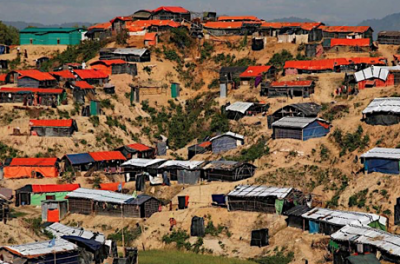Research Themes for UCL's Humanitarian Institute
- Social transformation to address global inequalities
- Conflict, humanitarian ethics and justice
- Border zones and diplomacy
- Migration
- 21st century technology for humanitarian issues
- Environmental and health disaster reduction
- Emergency planning and response
- Economic costs of humanitarian crises and migration
- Women's health, global health
- Equity of access to health care
- Sustainable development goals
- Built environment
- Safer schools and hospitals
- Co-producing knowledge
- Humanitarian statistics and operational research
- Social and cultural capital
- Historical perspectives
Current Funded Research Projects
- The Rohingya Exodus: Issues and Implications for Stability, Security and Peace in South Asia
(British Academy Award Reference: IC2\100178)

The British Academy invited proposals (Tackling the UK's International Challenges 2017) to bring original interdisciplinary research ideas from the humanities and social sciences to bear on our understanding of the international challenges and opportunities which the UK has faced, is facing and will face.
University College London (UCL) - Institute for Risk and Disaster Reduction and Humanitarian Institute - was successful in being awarded a project, "The Rohingya Exodus: Issues and Implications for Stability, Security and Peace in South Asia". The project will be conducted in the Rohingya refugee camps in Cox's Bazar, Bangladesh.
The Challenge for the Research
Given the recent Rohingya exodus to Bangladesh, this research aims to study the overall implications of this exodus for regional stability, security and peace. In so doing, this research also intends to understand causes and drivers of identity-based politics associated to Rohingya population in Myanmar. This study, which employs a mixed method approach including a survey, a number of key informant interviews and several short case studies of persecution, also wants to understand complex issues of management of large exodus of refugees in Bangladesh and how best to address them in the longer-term. This project intends to produce a policy brief, two peer-reviewed journal articles and to contribute to policy making related to management of the Rohingya refugee crisis at local, regional and international levels with a view to help in their repatriation process.
Principal Aim
This research will address the various humanitarian aspects of the Rohingya refugees in Bangladesh who have a longstanding history of being systematically oppressed and of facing violence, and are subject to forced displacement and ethnic cleansing by the Myanmar government.
Hypothesis
In the long run, it is possible to effectively repatriate and rehabilitate the Rohingya refugees in Myanmar considering the present geopolitical context in South Asia.
Objectives
- To understand and examine the changing nature and status of citizenship of Rohingya people in Myanmar over time.
- To examine the humanitarian implications of the Rohingya exodus in Bangladesh.
- To project the future trajectory of current Rohingya crisis in relation to their human rights and repatriation to Myanmar, and significant impacts on the geopolitics of the region.
Project Duration: January - December 2018.
Principal Investigator: Professor Peter Sammonds, UCL Institute for Risk and Disaster Reduction and UCL Humanitarian Institute, University College London (UCL), UK.
Project Coordinator: Dr. Bayes Ahmed, UCL Institute for Risk and Disaster Reductionand UCL Humanitarian Institute, University College London (UCL), UK.
Co-Applicants:
- Md. Touhidul Islam, Department of Peace and Conflict Studies, University of Dhaka, Bangladesh.
- Fahima Durrat, Department of Peace and Conflict Studies, University of Dhaka, Bangladesh.
- Mohammad Bulbul Ashraf Siddiqi, Department of Political Science and Sociology, North South University, Dhaka, Bangladesh.
- Anurug Chakma, Department of Peace and Conflict Studies, University of Dhaka, Bangladesh.
- Obayedul Hoque Patwary, Department of Peace and Conflict Studies, University of Dhaka, Bangladesh.
External Project Link: http://www.hkhresilience.com/rohingya/
Potential Project Partners: Handicap International Bangladesh, Christian Aid Bangladesh, BRAC, Bangladesh Institute of Planners, UN Women, UNDP Bangladesh, UNHCR and MSF.
 Close
Close

